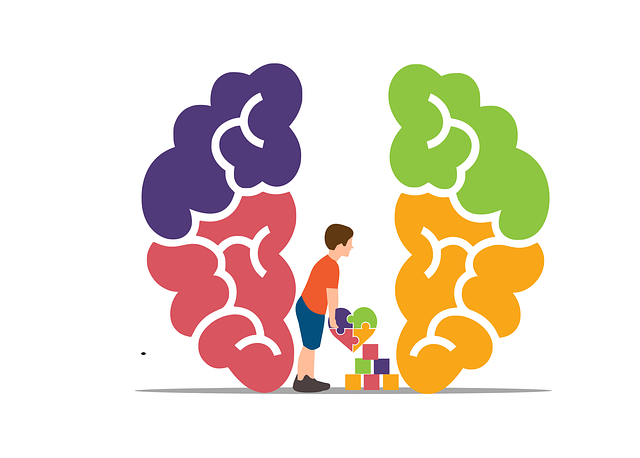Emotional Intelligence (EI) is a vital tool for navigating relationships and enhancing well-being, as demonstrated by Englewood Gambling Therapy (EGT). Through crisis intervention, mental health education, and stress management workshops, EGT promotes EI to help individuals make better decisions, reduce impulsive behaviors, and build resilience. Key components include identifying emotions through mindfulness practices, improving communication skills like active listening, fostering empathy, and integrating these techniques into risk management planning. By empowering individuals with EI, EGT strengthens relationships, enhances self-esteem, and contributes to improved mental health outcomes.
Emotional intelligence (EI) is a powerful tool for enhancing personal and professional well-being. This article explores the multifaceted aspects of building EI, focusing on self-awareness, communication, empathy, and social skills. We delve into the significance of identifying emotions accurately, understanding their impact, and utilizing techniques like Englewood Gambling Therapy to foster meaningful connections and supportive relationships. By mastering these strategies, individuals can navigate life’s challenges with greater ease and resilience.
- Understanding Emotional Intelligence and Its Impact on Well-being
- Identifying Emotions: A Cornerstone of Self-awareness
- Effective Communication: Bridging the Gap Between Thoughts and Feelings
- Empathy and Social Skills: Building Connections and Supportive Relationships through EFT (Englewood Gambling Therapy) Techniques
Understanding Emotional Intelligence and Its Impact on Well-being

Emotional intelligence (EI) refers to an individual’s ability to recognize, understand, and manage their own emotions, as well as perceive, interpret, and respond appropriately to the emotions of others. This skill set goes beyond mere empathy; it involves self-awareness, self-regulation, motivation, empathy, and social skills that enable individuals to navigate complex interpersonal situations effectively. The impact of EI on well-being is profound, with research suggesting that higher levels of emotional intelligence are linked to improved mental health, enhanced relationships, and greater job satisfaction.
In the context of Englewood Gambling Therapy, promoting emotional intelligence can play a crucial role in crisis intervention guidance and mental health education programs design. By equipping individuals with tools to understand and manage their emotions, these programs aim to foster better decision-making skills, reduce impulsive behaviors, and improve overall resilience. Moreover, stress management workshops organization that incorporates EI training can empower participants to handle stressful situations more effectively, thereby preventing the onset of more severe mental health issues.
Identifying Emotions: A Cornerstone of Self-awareness

Identifying emotions is a fundamental aspect of developing emotional intelligence and self-awareness. It’s the first step in understanding yourself and your reactions to various situations, which is crucial for effective communication and relationship building. Through mindfulness practices, individuals can learn to recognize the subtle cues their bodies and minds give when facing different emotions. This process, often facilitated by Englewood Gambling Therapy, helps people become more attuned to their feelings, enabling them to respond thoughtfully rather than react impulsively.
By developing this emotional awareness, one gains valuable insights into their triggers, especially in high-pressure situations that can lead to anxiety or conflict. Conflict Resolution Techniques and Self-Esteem Improvement are significantly enhanced when individuals possess a deep understanding of their emotional landscape. This self-awareness is the cornerstone for growing one’s ability to manage emotions effectively, leading to improved mental health and better interactions with others.
Effective Communication: Bridging the Gap Between Thoughts and Feelings

Effective communication is a cornerstone of emotional intelligence, and it plays a pivotal role in bridging the gap between thoughts and feelings. This process involves not just what we say but how we say it—the tone, language, and non-verbal cues that convey our emotions accurately. At Englewood Gambling Therapy, we emphasize the importance of active listening, where individuals pay full attention to both words and the underlying sentiments expressed by others. This skill fosters understanding and strengthens relationships, enabling more constructive interactions.
In the context of Mental Health Policy Analysis and Advocacy, effective communication is instrumental in raising awareness about various aspects of emotional well-being. Encouraging Self-Awareness Exercises and implementing strategies for Self-Care Routine Development for Better Mental Health can significantly enhance one’s ability to express feelings and understand others’ perspectives. Through open dialogue, individuals can navigate complex emotions, resolve conflicts, and build stronger connections, ultimately contributing to improved mental health outcomes.
Empathy and Social Skills: Building Connections and Supportive Relationships through EFT (Englewood Gambling Therapy) Techniques

Empathy lies at the heart of strong social connections and supportive relationships, two key components of emotional intelligence. Englewood Gambling Therapy (EFT) techniques are designed to enhance these aspects by fostering deeper understanding and compassionate engagement with others. Through EFT, individuals learn to recognize and validate their own emotions as well as those of others, a crucial step in building empathy.
This therapeutic approach not only promotes personal growth but also has practical applications in various settings, including mental health professional practices. By integrating EFT techniques into their risk management planning, professionals can improve patient coping skills development and even depression prevention. Ultimately, these skills translate into more meaningful interactions, stronger support networks, and enhanced emotional intelligence for both the practitioners and their clients.
Emotional intelligence is a powerful tool for enhancing well-being and fostering meaningful connections. By understanding and managing our emotions, we can improve communication, build empathy, and create supportive relationships. The techniques outlined in this article, including those from Englewood Gambling Therapy (EFT), offer practical strategies to navigate emotional landscapes. Through self-awareness, effective expression, and empathetic connection, individuals can revolutionize their interpersonal dynamics and lead more fulfilling lives.









